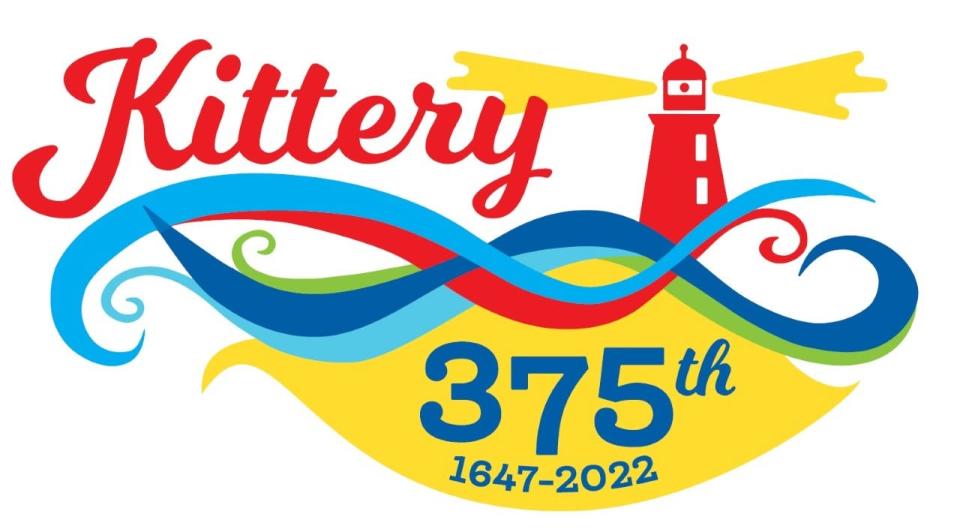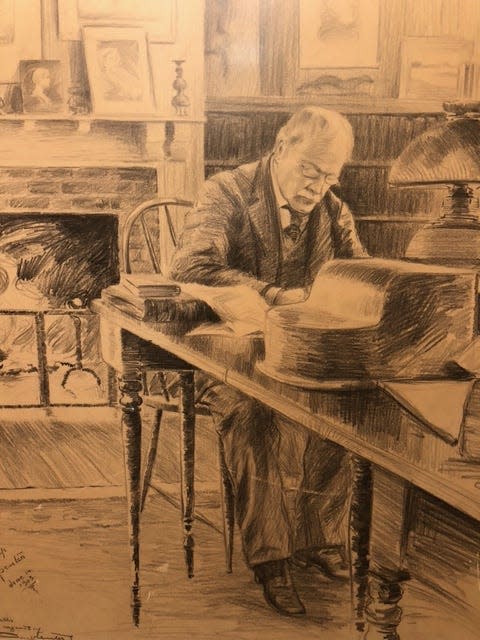Kittery, Maine 375th: William Dean Howells, Kittery's Literary Lion
- Oops!Something went wrong.Please try again later.
- Oops!Something went wrong.Please try again later.
This article is part of a monthly series celebration of Kittery’s history, as Maine’s oldest town counts down to its 375th birthday

When William Dean Howells was referred to as “the dean of American letters,” it wasn’t just a clever play on his name. For a time, Howells was the most influential figure in American literature.
After all, even Mark Twain called him “the Boss,” a century before the world came to know rock music legend Bruce Springsteen.
And in his twilight years, long after he had established himself as a novelist, critic, and perhaps most importantly, the powerful editor of the Atlantic Monthly, Howells chose the picturesque seaside town of Kittery, Maine, as his summer home.

Kittery is celebrating its 375th birthday this year, and early next month two events will explore the author’s connection to Maine’s oldest town. Which offers a unique opportunity to re-examine Howells’ now-underappreciated role in our nation’s literary heritage.
Susan Goodman, an English professor at the University of Delaware, co-authored a 2005 biography titled "William Dean Howells – A Writer’s Life." On Wednesday, May 4, Goodman will appear at the Kittery Community Center’s Star Theatre for a discussion about this titan entitled “Literature and Life.”
The event is free and open to the public, but registration is required.
Then on Tuesday, May 10, Goodman will lead two tours of Howells’ gambrel-roofed former residence at 36 Pepperrell Road in Kittery Point. These tours, to be held at 10 a.m. and 2 p.m., will be ticketed events and limited to groups of 15. Tickets may be obtained through Rice Public Library close to the tour date.
More: Hoppi's Barber Shop founder retires after 45 years. Regulars kept her going.
Both events are part of Kittery’s yearlong 375th anniversary celebration, and are intended to celebrate both the legacy of Howells and his deep ties to this town.
“Though living in Maine just a few months a year, he came to regard the house on Kittery Point as his home, New York his place of work,” Goodman and co-author Carl Dawson wrote in their biography of Howells. (pg 365).
To truly appreciate the stature of Howells in the late 19th and early 20th centuries, we have to remember that at the peak of his prominence the written word was everything. Motion pictures and television did not yet exist; popular music recordings were a few years away. Sports fans could not watch their favorite athletes onscreen or even listen to events on the radio.
The only way to reach mass audiences at this time was through the page. Poets and novelists were the pop superstars of their day. And as editor of the Atlantic Monthly, Howells played a huge role in shaping that scene. Goodman and Dawson describe him in their book as “possibly the most influential figure in the history of American letters.”
Born in 1837 to an Ohio newspaperman, Howells and his family enjoyed friendships with future Presidents Rutherford B. Hayes and James Garfield, both fellow Ohioans. In his early 20s, he wrote a campaign biography for the Republican presidential ticket of Abraham Lincoln and Maine’s own Hannibal Hamlin, Lincoln’s running mate.
When Lincoln and Hamlin won the 1860 presidential election, Howells was awarded the position of consul in Venice, a diplomatic post, where he spent the duration of the Civil War. Upon his return to the U.S., he was hired as assistant editor of the Atlantic Monthly, one of the leading and most influential literary magazines in the country. In 1871, he ascended to the editorship of the magazine.
From this perch and beyond, Howells in the following years went on to champion such rising American writers as his dear and lifelong friend Mark Twain, Henry James, Stephen Crane and South Berwick native Sarah Orne Jewett.
“As editor of the Atlantic Monthly and later as columnist for Harper's Weekly, Howells swayed the tastes and values of a growing middle-class readership, leaving his stamp on American culture,“ Goodman and Dawson wrote in their biography. (preface xiv)
But he also started cranking out a flood of his own novels during this era. Howells is considered one of the pioneers of realism in American literature, and novels such as "A Modern Instance," which dealt with the then-rather taboo subject of divorce, and "The Rise of Silas Lapham," his best-known work, brought him great acclaim. In 1898, Howells topped a poll ranking the ten best American writers, with his buddy Twain coming in second.
Goodman and Dawson described him as “a writer whose imagination changed the standards of American fiction.” (preface xiv) He also generated plays, poetry, essays and memoirs.
In 1904, he was one of the first seven members voted to the American Academy of Arts and Letters, along with Twain and New Hampshire sculptor Augustus Saint-Gaudens. He later served as president of the academy, and every five years this organization still bestows the William Dean Howells Medal upon what members consider the most distinguished novel published during that span. The list of past winners includes Faulkner, Cheever, Updike and Welty.
So yeah, this guy is a big deal.
So significant was his influence that in 1997, scholars created the William Dean Howells Society to study his works. The organization publishes articles, materials and general information pertaining to American literature, according to Goodman, who previously served as president.
The society hosted a symposium in 2007 at Howells’ Kittery Point home after her book on the author was published, she noted recently. His influence remains prevalent today even among those who may not be aware of it, Goodman stated.
“Most people's knowledge of American literature is indebted to decisions made in his editorships of the Atlantic Monthly and Harper's Magazine, not to overlook his numerous critical essays about Literature and Life (to borrow one of his book titles),” she wrote earlier this month.
Howells initially came to the Seacoast in 1898, according to Goodman, and in 1902 he purchased the home located on Pepperrell Road, situated right between Fort McClary and the oldest church in Maine. His wife Elinor worked her gardens there and Howells converted a stable into a library, which he referred to as his “barnbrary.”
Built around 1870, the two-acre waterfront property looks out over Portsmouth Harbor. A large Bellamy eagle still hangs over the garage entrance. Workers are currently getting the place in shape for the upcoming May tours.
“Of all their houses, they may have loved the one at Kittery Point most,” Goodman and Dawson wrote of the couple in their book. (A Writer’s Life (pg 365)
Howells was known to refer to the house as their "rugged little nest on the Maine coast." Friends like Twain and Henry James journeyed here to visit the great man, as did “half of literary Boston,” who stayed in the resort hotels located in town or on Appledore, among the Isles of Shoals, according to Goodman.
But in 1910, Howell’s wife Elinor and Twain both passed away. The house “was dear but also too closely linked with his loss,” Goodman noted. “He lived in Kittery Point the longest he lived in one place.”
Howells relocated to York afterward but kept the Pepperrell Road property in the family, passing it on to his son John Mead Howells, a renowned architect in his own right. It was gifted to Harvard University in the 1970s, and remains under the school’s stewardship, used for retreats for faculty and staff. The house was listed on the National Register of Historic Places in 1979.
As Kittery celebrates its 375th year, Rice Public Library thought it would be appropriate to provide “a glimpse into the life of the noted literary figure William Dean Howells,” director Lee Perkins said recently. “The tour gives our residents the opportunity to tour his home and hear Dr. Goodman unpack the nuances of his writing and life.”
There’s also a direct link between the local library and the Howells family, as the non-fiction room in the building’s ground floor is named for longtime patron Kay Howells, who was married to the writer’s great grandson.
Howells died in New York City in 1920, at the age of 83, on May 11th. The day following the two tours of his beloved "rugged little nest on the Maine coast" will mark the 102nd anniversary of his passing.

D. Allan Kerr is a member of Kittery’s 375th Celebration Committee.
This article originally appeared on Portsmouth Herald: Kittery, Maine 375th: William Dean Howells, Kittery's Literary Lion

